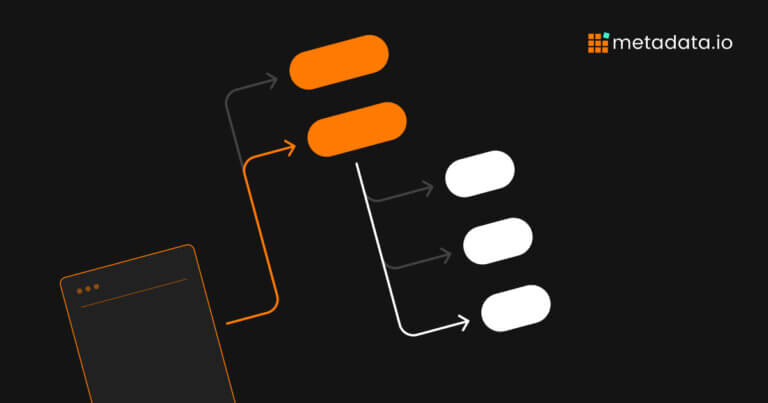Transforming Google Search Ads Performance: Leveraging Metadata for Optimization and Efficiency
Introduction to Metadata and Google Ads
Managing Google Ads can be both exhilarating and frustrating. Many marketers understand this complex dance, but Metadata offers a way to optimize the experience. By providing detailed insights, Metadata helps shift from guessing to informed decision-making.
Jason Douglas, our lead solutions architect, dove into how Metadata unlocks Google Ads’ potential in our latest webinar. Jason brings years of expertise in digital marketing across platforms like Google, Facebook, LinkedIn, Twitter, SEO, and email. He has optimized millions of dollars spent through paid media, and his extensive knowledge of significant annual paid media expenditures ensures you maximize the effectiveness of your campaigns.
Let’s talk about how Metadata can elevate your Google Ads strategy, from pinpointing inefficiencies to optimizing your budget. Ready to transform your Google Ads experience? Let’s dive in.
Watch the full webinar here
The Value of Detailed Reporting
Detailed reporting is the cornerstone of optimizing Google Ads campaigns. Metadata excels in providing in-depth analysis down to the keyword level, offering metrics like CpMQL, cost per opportunity, pipeline, and closed-won revenue. This granular detail transforms decision-making and budget allocation.
Native platforms often leave you guessing about the impact of each keyword or campaign. Metadata integrates with CRM systems like Salesforce and HubSpot, allowing for automatic syncing of metrics beyond basic lead tracking. This means knowing how many leads you generate, their quality, and revenue potential.
Connecting ad performance to revenue generation changes the game. Understanding the actual value of each keyword enables more informed decisions, focusing on what truly drives your business forward: revenue. This empowers you to adjust your campaigns based on live data, ensuring effective budget spending.
Unlocking the Full Potential of Google Ads with Metadata
Optimizing Beyond Leads
Many Google Ads accounts lack offline conversion tracking, leading to suboptimal performance. Metadata bridges this gap by enabling optimization based on metrics like MQLs, opportunities, and revenue, ensuring you’re collecting leads and nurturing potential business opportunities.
Without offline conversion tracking, you’re flying blind, optimizing toward basic conversions rather than meaningful outcomes. Metadata integrates with CRM systems to pull in additional metrics, allowing you to optimize for leads, opportunities, and revenue.
Jason Douglas identified common issues in native Google Ads accounts, such as optimizing for the wrong metrics. Metadata allows setting distinct primary metrics, ensuring campaigns focus on what drives your business. Whether your goal is generating qualified leads or increasing revenue, Metadata aligns your campaigns with your business objectives.
Budget Protection and Efficient Spending
Effective budget management is crucial for successful Google Ads campaigns. Metadata employs strategies to ensure every dollar spent contributes to achieving business goals. One standout feature is budget groups, allowing flexible allocation across multiple campaigns and channels.
Imagine running campaigns on Google, LinkedIn, Facebook, and Instagram. Traditionally, you might allocate a fixed budget to each channel. However, Metadata’s budget groups enable pooling budgets together, allowing funds to shift dynamically based on performance, maximizing ROI.
Autopause rules are another critical component, automatically pausing underperforming experiments based on predefined thresholds. This prevents unnecessary overspending, ensuring budget efficiency.
Real-time optimization is key to avoiding reactive paid media strategies. Metadata provides real-time data, allowing informed adjustments on the fly, ensuring optimal campaign performance.
Common Pitfalls and Best Practices
Running Google Ads campaigns presents pitfalls that can hinder success if not addressed. One significant issue is the misalignment between ad content and landing page experiences, drastically affecting conversion rates.
Best Practices to Avoid Misalignment:
- Consistent Messaging: Ensure your landing page reflects your ad copy promises.
- Clear Calls to Action: Guide users towards a single, clear action.
- Relevant Content: Provide the information users expect based on your ad, enhancing their journey.
Metadata bridges the gap between ad content and landing page alignment, offering guidance on optimizing landing pages to match ad content. Continuous monitoring and adjustment are vital for maximizing campaign success, ensuring relevance and effectiveness.
Key Areas for Continuous Monitoring:
- Ad Performance: Track click-through and conversion rates.
- Landing Page Engagement: Use tools like heatmaps to understand user behavior.
- Keyword Relevance: Ensure keywords align with user intent and adjust bids accordingly.
By following these best practices and leveraging Metadata, marketers can avoid common pitfalls and create effective, high-converting Google Ads campaigns.
Conclusion and Call to Action
Detailed reporting, optimization beyond leads, budget protection, and efficient spending are essential for successful Google Ads campaigns. Metadata provides granular insights, allowing informed decision-making and precise budget allocation, directly linking ad performance to revenue.
Optimization should extend beyond lead-level metrics. Metadata empowers users to optimize based on qualified leads, opportunities, and revenue, bridging gaps in native Google Ads accounts and connecting ad performance to tangible business outcomes.
Protecting your budget and ensuring efficient spending are equally critical. Metadata’s budget groups, flexible allocation, and autopause rules safeguard against overspending. Real-time optimization prevents reactive strategies, maximizing ROI.
Common pitfalls often stem from misaligned ad content and landing page experiences. Metadata offers guidance on aligning these elements, enhancing campaign performance. Continuous monitoring and adjustment ensure ongoing relevance and effectiveness.
Why Consider Metadata?
- Detailed Reporting: Gain insights into critical metrics.
- Beyond Leads Optimization: Optimize based on qualified leads, opportunities, and revenue.
- Budget Protection: Prevent overspending with flexible allocation and autopause rules.
- Expert Guidance: Benefit from audits, consultations, and personalized recommendations.
Connect with Metadata: Explore further assistance through audits, consultations, and personalized recommendations. Engage with Jason Douglas or the Metadata team here to unlock the full potential of your Google Ads campaigns.


